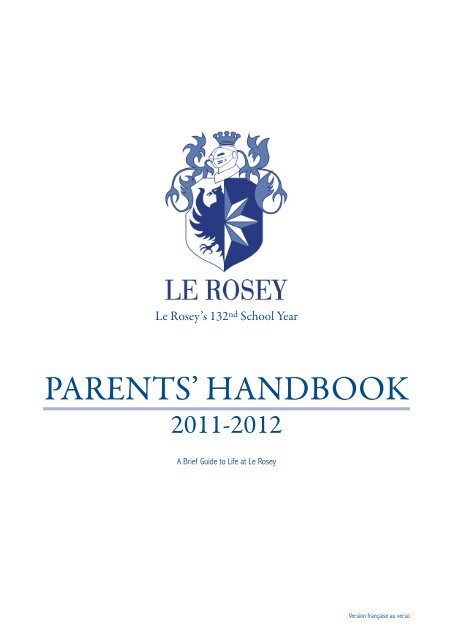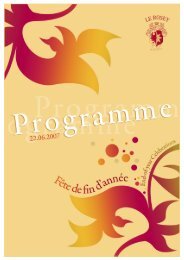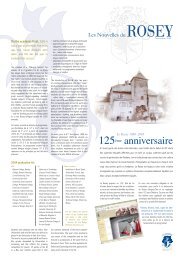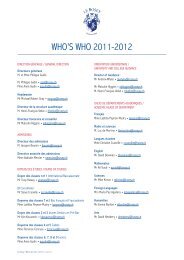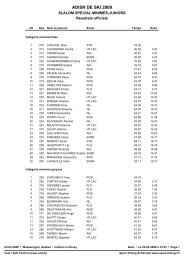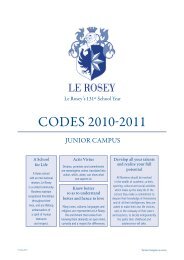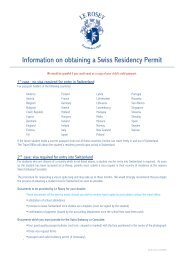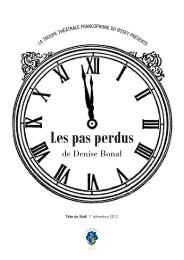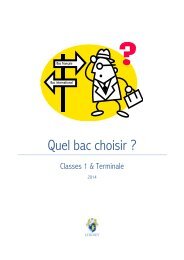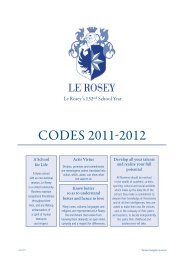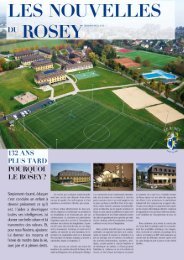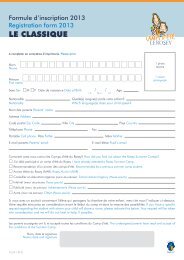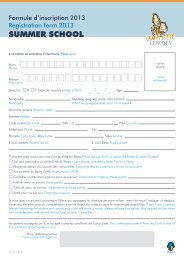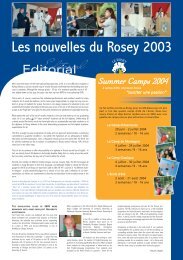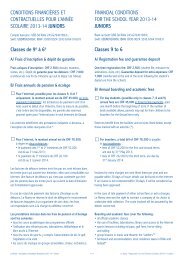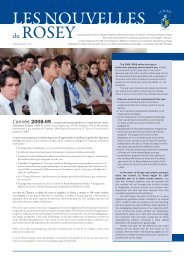PARENTS' HANDBOOK - Le Rosey
PARENTS' HANDBOOK - Le Rosey
PARENTS' HANDBOOK - Le Rosey
Create successful ePaper yourself
Turn your PDF publications into a flip-book with our unique Google optimized e-Paper software.
<strong>Le</strong> <strong>Rosey</strong>’s 132 nd School Year<br />
PARENTS’ <strong>HANDBOOK</strong><br />
2011-2012<br />
A Brief Guide to Life at <strong>Le</strong> <strong>Rosey</strong><br />
Version française au verso
V.1 July 2011
A bilingual, international boarding school, based on holistic educational principles and with a long-standing commitment to<br />
what are nowadays called “multiple intelligences”, is by definition a complex place. To make it all work, <strong>Le</strong> <strong>Rosey</strong> naturally<br />
encourages the collaboration and understanding of its parents.<br />
This booklet is designed to help parents appreciate the nature of life at <strong>Le</strong> <strong>Rosey</strong>, to facilitate communication with the<br />
school and to plan visits, departures and weekends.<br />
This Handbook does not, however, replace other official school documents such as the Codes and the Academic Guides, and<br />
parents are welcome to request further documentation from the school or to follow up on the links offered in the following<br />
pages.<br />
Understanding <strong>Le</strong> <strong>Rosey</strong> page 4 Non-Academic Activities page 12<br />
- The Codes - The Sports-Arts Bloc<br />
- Bilingualism and Biculturalism - Music and Theatre<br />
- The Different Sections and Classes - <strong>Le</strong>arning to Play an Instrument<br />
- The School Day and the Blocs - School Trips<br />
- Gstaad - Weekend Trips<br />
- Exeats and Weekends - Educational Visits<br />
- The Study Group System - Honour Trips<br />
- 100% Boarding<br />
IT and Computing page 14<br />
Life on Campus page 5<br />
- Boarding The Pastoral System and Counselling page 14<br />
- Rooms - A Pastoral Network<br />
- Activities and the Agenda - University and College Guidance<br />
- Health<br />
- Safety The Role of Parents page 15<br />
- Food - Communication<br />
- Alcohol - Parents’ Obligations<br />
- Smoking - Parents’ Days<br />
- Drugs<br />
- The Dress Code Arrivals and Departures page 17<br />
- Discipline and the conseil de discipline - What Transport is Available from the<br />
- The Comité - School<br />
- The Charity Steering Committee and Charity - Weekends<br />
- Exceptions and Special Cases<br />
Academics page 9 - Blocked Weekends<br />
- Marking Periods and Reports - Visiting Your Children at School<br />
- Passing the Year and Repeating the Year - Sorties<br />
- Understanding the School Report - Special Absences<br />
- What do the Grades Mean<br />
- Effort Grades <strong>Rosey</strong>-speak page 19<br />
- Finding Out More about Grades<br />
- Transcripts<br />
- “Prep” or Homework<br />
- <strong>Le</strong>arning Support<br />
- Gifted and Talented Students<br />
- Extra Classes<br />
- Extra-Curricular Languages<br />
<strong>Le</strong> <strong>Rosey</strong> • Parents’ Handbook 2011-2012 3
Understanding <strong>Le</strong> <strong>Rosey</strong>: Some Essentials<br />
No two schools are exactly alike but <strong>Le</strong> <strong>Rosey</strong> can reasonably claim to be unique. Different things stand out as vital to<br />
understanding the school.<br />
1. The Codes<br />
The Codes set out the basic principles of school life. As well as detailing <strong>Le</strong> <strong>Rosey</strong>’s disciplinary system and school rules,<br />
daily schedules and the Honour Code, they also provide details of many of the subjects covered in this Handbook. All<br />
students are bound by the rules in the Codes, and they officially recognize this by signing them at the beginning of the<br />
academic year. It is also important for the Codes to be recognized and upheld by parents who, in collaboration with the<br />
school, will do their utmost to ensure that they are respected by their children.<br />
2. Bilingualism and Biculturalism<br />
<strong>Le</strong> <strong>Rosey</strong> is a French-English bilingual (or dual-language) school. In practical terms this means that all students study both<br />
French and English at an appropriate level, and that, as soon as is possible, they begin the study of one or more academic<br />
subjects in their second language.<br />
In cultural terms, however, the school’s bilingualism has an enormous impact on everyday life: both languages are<br />
used on a daily basis; much of the terminology used is French; and the school’s character and philosophy owe as much to<br />
French as to American or British models.<br />
3. The different Sections and Classes (Codes: C-6)<br />
Unlike numerous other boarding schools across the world, <strong>Le</strong> <strong>Rosey</strong> believes that it is both stimulating and educationally<br />
beneficial to accept students of both sexes from age 8 to 18. For those accustomed to the US or British terms, the names<br />
given to different age-groups at <strong>Le</strong> <strong>Rosey</strong> can be initially confusing. <strong>Le</strong> <strong>Rosey</strong> follows the French model, so grade levels<br />
or year groups are called classes; as students get older, the number of their classe “counts down” to graduation. What is<br />
more, the educational programme is divided into four different stages or sections:<br />
Typical Age<br />
<strong>Le</strong> <strong>Rosey</strong><br />
Classe<br />
<strong>Le</strong> <strong>Rosey</strong> Section<br />
USA<br />
grade<br />
UK<br />
year<br />
Spain<br />
grade<br />
Switzerland<br />
grade (Geneva)<br />
8-9 9 e Juniors<br />
3 4 Primario 3 4 P<br />
9-10 8 e (although pupils<br />
4 5 Primario 4 5 P<br />
in class 6 follow a<br />
10-11 7 e “secondary” academic 5 6 Primario 5 6 P<br />
11-12 6 e programme)<br />
6 7 Primario 6 7 e C.O.<br />
12-13 5 e 7 8 ESO 1 8 e C.O.<br />
Cadets<br />
13-14 4 e 8 9 ESO 2 9 e C.O.<br />
14-15 3 e Jeunes Seniors (the 9 10 ESO 3 1 ère Collège<br />
15-16 2 e pre-Bac programme) 10 11 ESO 4 2 e Collège<br />
16-17 1ère Seniors (the French 11 12 Bachillerato 1 3 e Collège<br />
Bac or the International<br />
17-18 t (terminale) Baccalaureate)<br />
12 13 Bachillerato 2 4 e Collège<br />
There are clearly differences between what is acceptable for an eleven-year-old and an eighteen-year-old, and boarding<br />
house rules, academic options and timetables vary according to the student’s section and classe. Again all the details are<br />
in the Codes and even if the rules seem quite complicated, the essential principles are simple: increase students’ freedom<br />
as they become more mature – and as long as they demonstrate a sense of responsibility.<br />
4. The School Day and the Blocs (Codes: E-1, E-5, E-6, E-7 and E-8)<br />
The Codes provide a complete guide of the school day but it is useful to bear in mind that it is split into three parts:<br />
first, the academic bloc, from 8.00 a.m. to 3.30 p.m.; second, the sports-arts or “CASC” bloc (the time for “co-curricular”<br />
activities) from 4.00 p.m. to 6.00 p.m.; and, third, evening study hall from 6.25 p.m. onwards – a bloc which may also<br />
include rehearsal time and cultural activities. Study hall time naturally varies according to the section a student belongs to.<br />
<strong>Le</strong> <strong>Rosey</strong> • Parents’ Handbook 2011-2012 4
5. Gstaad<br />
(Gstaad Adjustments to Codes distributed in January)<br />
Perhaps the key difference between <strong>Le</strong> <strong>Rosey</strong> and any other school in the world is the winter term. Since 1916, <strong>Le</strong> <strong>Rosey</strong><br />
has spent the second term in the mountains, and the benefits of this – in terms of health and the reinvigoration which a<br />
change of scene can provide – are enormous. Many aspects of school life at <strong>Le</strong> <strong>Rosey</strong>’s alpine campus are the same as<br />
they are at Rolle: the male and female campus arrangement remains and students’ academic programmes continue as<br />
normal, for example.<br />
On the other hand, there are a number of important changes which parents should be aware of. Most importantly, the<br />
daily schedule is altered so as to provide four full skiing afternoons per week by redistributing lessons. This means longer<br />
mornings as well as classes on Saturday morning – and subsequently a shorter weekend. There are also adjustments<br />
to the Codes to take account of the new daily schedule (particularly when planning weekends; see p.27), the greater<br />
distance between the boys’ and girls’ campuses, and the situation of the school in the centre of a busy, if exclusive, alpine<br />
ski resort.<br />
The Gstaad term is also quite tiring for students and teachers so it also slightly shorter than most schools’ second<br />
term, meaning that <strong>Le</strong> <strong>Rosey</strong>’s Easter vacation often falls at a slightly unusual time. Parents should be aware of this when<br />
planning holidays.<br />
6. Exeats and Weekends<br />
Many boarding schools (particularly, but not only, in the UK) have Exeat weekends when all students leave campus and<br />
return home. The other weekends of the term are spent on campus. <strong>Le</strong> <strong>Rosey</strong>’s system is entirely different.<br />
Because the vast majority of <strong>Rosey</strong> students come from all over the world, most would be unable to return home for<br />
a weekend; what is more, if parents or close relatives come to Switzerland to visit, it makes no sense to block a student<br />
on campus when they could be spending the weekend with their family. Thus, although a small number of weekends must<br />
be spent on campus, the others may be spent off-campus with the family. The rules governing these arrangements are<br />
extensive; they are explained in detail below.<br />
7. The Study Group System (Codes: E-2)<br />
Parents will soon become aware of <strong>Le</strong> <strong>Rosey</strong>’s study groups since they affect students’ lives to a considerable extent.<br />
Essentially, students’ academic results and attitude and effort grades place them in one of five groups: Highest Achievement,<br />
Honneur, Privilège, Passable and Insuffisant. The better the results obtained, the more privileges students enjoy. The<br />
system is particularly important when parents are planning visits, weekends and departures.<br />
8. 100% Boarding<br />
<strong>Le</strong> <strong>Rosey</strong> is a 100% boarding school and the long-term advantages of boarding – camaraderie, school spirit, and<br />
independence – depend upon students’ presence at school outside study and sports time, and often at weekends. What<br />
is more, we are a very international school (more than 50 nations with a maximum of 10% of students from one country<br />
or group of countries), and having a diverse student body from the four corners of the world makes it extremely difficult<br />
but doubly important for rules to be applied equitably. Communication between school and family should be easy and<br />
constructive but we also pride ourselves on our ability to follow the rules and, if necessary, to refuse requests that do not<br />
respect the spirit of the school.<br />
Life on Campus<br />
1. Boarding<br />
Unlike traditional British boarding schools, <strong>Le</strong> <strong>Rosey</strong> does not place students in houses of mixed ages run by a Housemaster<br />
or Housemistress with the aid of an assistant. Nor does it follow the US system of dorms with student proctors. Instead,<br />
maisons (or chalets in Gstaad) are organized according to age groups, where boys or girls of particular year groups or<br />
grade levels live together with full-time teaching members of staff.<br />
There are four boys’ maisons on the Rolle campus and three maisons on the girls’ campus. There is also a separate<br />
mixed Junior maison on the Rolle campus. All maisons have a teacher (and usually his or her family) in charge, although<br />
authority for boarding on each campus ultimately resides not with them, but with the Directors of Boarding or Directeurs<br />
d’internat.<br />
<strong>Le</strong> <strong>Rosey</strong> • Parents’ Handbook 2011-2012 5
Normally, the boys or girls of two year groups are housed together, meaning that each maison can have its own<br />
age-specific character, activities and rules. The maisons usually have various floors (or étages) and there are at least two<br />
teachers living on each floor. The average ratio of students per resident teacher is 10:1. Students of a particular age or<br />
year group are, as far as possible, housed on the same floor.<br />
At present, the distribution of ages and houses is as follows:<br />
Rolle, <strong>Le</strong> <strong>Rosey</strong> Boys’ Campus<br />
Maison Ages Section / Classes Chef(s) de maison<br />
Driancourt 12-14 Cadets cl. 5 and 4 Mr and Mrs Newbery<br />
Whitehead 15-16 Jeunes Seniors cl. 3 and 2 Mr Zürcher; Mr and Mrs Spencer<br />
Vuilleumier 16-17 Seniors cl. 1 Mr and Mrs Bérubé<br />
Norton 17-18 Seniors cl. t Mr and Mrs Norton<br />
Rolle, <strong>Le</strong> <strong>Rosey</strong> Junior Campus for Boys and Girls<br />
Juniors 8-11 Juniors, cl. 9 to 6 Mr and Mrs Bacher ; Mrs de Martino<br />
Rolle, La Combe Girls’ Campus<br />
Grande Combe 12-14 Cadets cl. 5 and 4; some cl. 3 Mr and Mrs Recoing<br />
Stickel 15-16 Jeunes Seniors cl. 3 and 2; some cl. 1 Mr and Mrs Halsey<br />
Mottiez 17-18 Seniors cl. 1 and t Ms Roux<br />
Boarding House rules can be found in the Codes but parents are encouraged to contact the Directeurs d’internat for<br />
more precise indications of internal norms and timetables.<br />
In Gstaad, students change from maisons to chalets. Where possible, arrangements mirror those in Rolle but chalets<br />
are smaller and therefore more numerous. At present, the Gstaad arrangements are as follows:<br />
Gstaad, <strong>Le</strong> <strong>Rosey</strong> Boys’ and Juniors’ Campus<br />
Schönried Girls’ Campus<br />
Chalet Ages Classes Chef(s) de maison Chalet Ages Classes Chef(s) de maison<br />
Roberti 8-11 Juniors Mr and Mrs Bacher M.-Françoise 12-14 cl. 5, 4 and 3 Mr and Mrs Recoing<br />
Rübli 12-14 cl. 5 and 4 To be annonced Meiteli 14-15 cl. 3 and 2 To be annonced<br />
Meirisli 8-11 Juniors Mr and Mrs de Martino Henry 15-16 cl. 2 and 1 Mr and Mrs Halsey<br />
Jacqueline 14-15 cl. 3 and 2 Mr and Mrs Spencer Anne 16-18 cl. 1, t Ms Roux<br />
Ried 14-15 cl. 3 and 2 Mr and Mrs Bérubé<br />
Riedhus 16-17 cl. 1 Mr Pesse<br />
Castimaz 17-18 Terminale Mr and Mrs Norton<br />
2. Rooms<br />
It is deliberate policy at <strong>Le</strong> <strong>Rosey</strong> for students to share rooms in the belief that this is of value both academically and<br />
socially. In general, bedrooms are for two students. In Rolle, however, most class t students have single rooms to ensure<br />
optimal study conditions. Nearly all rooms have en-suite bathroom facilities.<br />
Because of <strong>Le</strong> <strong>Rosey</strong>’s two-campus system, students obviously change rooms – and often roommates – twice a<br />
year. Students request rooms and roommates for the following term about halfway through the first and second terms. In<br />
general, students’ wishes are respected, although the directors of boarding make the final decision based on academic<br />
and disciplinary records, study groups and the advice of boarding house and academic staff.<br />
Many students and parents request rooms with speakers of another language, particularly French, and although this<br />
cannot be guaranteed, the school attempts to satisfy such demands.<br />
<strong>Le</strong> <strong>Rosey</strong> • Parents’ Handbook 2011-2012 6
3. Activities and the Agenda (Codes: E-9)<br />
During the week, there are very many on- and off-campus evening activities. Broadly speaking, study hall is compulsory<br />
most nights of the week but all students have the right to sign up for an evening activity for all or part of one evening.<br />
Some of these have an academic slant (the Speakers’ Program, the Académie, the Model United Nations, etc.), some<br />
are artistic (music and theatre rehearsals or visits), some are sporting (soccer, unihockey, karting, etc) and some are<br />
recreational (such as a sortie with a teacher). All students have an agenda which is checked by their chef de maison, since<br />
the rules regarding the number of activities possible vary in line with the students’ section and study group.<br />
4. Health (Codes: C-2)<br />
Both the boys’ and girls’ campuses have two full-time nurses and an infirmary. The rules regarding appointments and<br />
visits are explained in the Codes. The school also has close links with local doctors in both Rolle and Gstaad and arranges<br />
visits as and when necessary. There are excellent university teaching hospitals and specialists nearby in Lausanne, Geneva<br />
and Bern, as well as smaller hospitals in Nyon, Morges and Saanen. Private clinics in Genolier and Lausanne are also easily<br />
accessible, as are excellent dentists and orthodontists. Please note that all <strong>Rosey</strong> students’ obligatory accident insurance<br />
covers private treatment in hospitals and clinics. Further details may be found in the Financial Conditions.<br />
Parents are immediately informed of all serious illnesses and accidents, and are obviously consulted before surgery<br />
unless immediate emergency treatment is required. <strong>Le</strong> <strong>Rosey</strong> is prepared for health emergencies such as Avian Flu.<br />
It is, of course, extremely important for the school to be informed of any long-standing complaints, conditions and<br />
treatments, and medicines must be handed over to the nurses who supervise ongoing treatment. No student can attend<br />
<strong>Le</strong> <strong>Rosey</strong> without providing the school with a health form duly completed by their family doctor, and those parents who<br />
accompany their children when they begin school are requested to see the nurses.<br />
Many students continue important medical, dental or orthodontic treatment in their countries of origin but parents<br />
are requested to ensure that all such appointments are arranged to take place during the school holidays.<br />
<strong>Le</strong> <strong>Rosey</strong> also believes in a pro-active approach to health. Following the old adage of “a healthy mind in a healthy<br />
body”, all students play sports and participate in expeditions. The school day, and particularly lights-off times, are also<br />
intended to ensure that students get sufficient exercise, activity and, crucially, sleep – and parents are encouraged to<br />
maintain similar if less stringent régimes during weekends and the school vacations.<br />
5. Safety (Codes: C-2)<br />
<strong>Le</strong> <strong>Rosey</strong> believes in stretching its students and making demands on them, but at the same time, safety is the most<br />
important concern, and Switzerland deserves its reputation as a safe country. Yet this is an area where there can be no<br />
room for complacency. With the enormous number of activities, excursions and expeditions throughout the year, safety<br />
considerations are paramount and rules and procedures are strict – although the school cannot take responsibility for<br />
those students who do not follow instructions. This is a prime concern on expeditions and throughout the winter term when<br />
students are exhaustively briefed on safety and must follow strict rules regarding helmets, hors-piste skiing, etc. Parents<br />
who would like further details are invited to contact the sports or expeditions department.<br />
During the night, security guards patrol the campus and may be called should the need arise. Personal bodyguards,<br />
however, are not allowed on campus.<br />
6. Food<br />
All meals are taken at school in either the boys’ or girls’ dining hall. Attendance at lunch and dinner is compulsory for all<br />
students; all boys and some girls are required to check in for breakfast. Lunch and dinner are taken at designated places<br />
in the company of teachers rather than in the maisons. During the week, with the exception of Monday lunchtime, meals<br />
are served at table, usually by students according to a duty rota.<br />
Menus on the boys’ and girls’ campus differ, although both offer a large choice of self-service salads usually<br />
as a principal or alternative first course in addition to the main course and dessert. The style of food is French with<br />
an international accent. Despite inevitable student complaints, the standard of food served is high, and student food<br />
committees have regular meetings with the chefs to voice their opinions and preferences. Vegetarian dishes are available<br />
at every meal and, wherever possible, provision is made for special dietary requirements, including those dictated by<br />
religious belief – snack breakfasts are provided the night before during Ramadan, for example.<br />
The school intends that meals should be both healthy and balanced and does not allow deliveries of take-away “junk<br />
food”. Healthy snacks are available from the cafeteria where students are offered free freshly-squeezed orange juice at all<br />
times of the day. There are also drinks machines on campus but these offer only healthy alternatives to Coke and the like,<br />
such as flavoured mineral waters and fruit juices. Water fountains are to be found across the campus.<br />
<strong>Le</strong> <strong>Rosey</strong> • Parents’ Handbook 2011-2012 7
Most maisons also offer large and well-appointed student kitchens for suppers or cooking activities.<br />
All staff pay particular attention to students’ eating habits and there is sensitive supervision of those deemed<br />
susceptible to eating disorders. Any parents with particular concerns in these or related areas are encouraged to contact<br />
the school directly.<br />
7. Alcohol (Codes: B-6)<br />
In line with European practice, Swiss law authorizes the consumption of beer or wine by 16-year-olds and of spirits by<br />
18-year-olds. The school’s policy is much stricter than this but alcohol is not entirely banned. <strong>Le</strong> <strong>Rosey</strong> students are not<br />
allowed alcohol of any sort on campus (except at specially organized wine-tasting sessions), yet senior students, when<br />
they are on sortie with a member of staff, may drink in accordance with Swiss law and within the limit allowed for driving.<br />
Any student suspected of drinking in excess of this or of under-age drinking is tested and is liable to heavy sanctions.<br />
8. Smoking (Codes: B-8; D-6)<br />
In accordance with Swiss law, smoking is not permitted on campus.<br />
9. Drugs (Codes: B-1)<br />
<strong>Le</strong> <strong>Rosey</strong>’s rules on drugs are strict and inflexible. Any student found guilty of any consumption or possession at any time<br />
is immediately expelled with no possibility of appeal. All students have to be ready to undergo drug tests at any time: some<br />
of these are “sweat tests” using the latest technology but the most numerous are random urine tests, over 400 of which<br />
are carried out every academic year, in the belief that we cannot be too careful in this area.<br />
10. The Dress Code (Codes: C-3)<br />
<strong>Le</strong> <strong>Rosey</strong>’s policy on school uniforms and dress code is intended to prepare students for life after school. Full formal<br />
uniform has to be worn on a number of school occasions every year; and, during the week, students are expected to<br />
dress slightly more formally for dinner (jacket and tie for the boys and blouse and jacket for the girls). At all other times,<br />
students may dress casually but must respect a number of basic rules regarding tidiness, hair length, revealing clothing<br />
and so on. Full details are in the Codes.<br />
11. Discipline and the conseil de discipline (Codes: B; D-8, D-9)<br />
Discipline at <strong>Le</strong> <strong>Rosey</strong> is based on the school’s guiding principles; it is not an end in itself but a means of ensuring a<br />
harmonious community life. Our aim is to ensure that it is seen as such and that rules are applied conscientiously, fairly<br />
and humanely – but also firmly. The Codes provide details of the essential school rules and sanctions. When a student’s<br />
disciplinary record becomes a matter of serious concern or if a major rule is infringed, then he or she is called to appear<br />
before a conseil de discipline, made up of members of the direction, the adults concerned and student representatives.<br />
The decision taken by the Council is immediately communicated to the pupil and his or her parents. There is no system of<br />
appeal.<br />
12. The Comité<br />
<strong>Le</strong> <strong>Rosey</strong> does not have a British-style prefect system, but it does have group of twenty students (ten boys and ten girls)<br />
called the Comité, whose role is to represent the students and student views to the direction of the school. Although the<br />
Comité is expected to set an example to students and to support the school and its ethos, it does not exist to help apply<br />
school rules around campus, nor are its members given disciplinary powers.<br />
The Comité is elected on a yearly basis entirely by fellow students. In the winter term, students in classes 2 and 1 can<br />
put themselves forward for inclusion on the Comité. At an after-dinner session on each of the two campuses, candidates<br />
give short speeches to all other students who afterwards vote. The Directors of Boarding act as tellers, but neither they<br />
nor any other member of the school have a say in the outcome of the vote. The ten students with most votes on each<br />
campus become Comité members and the four students (two girls and two boys) with the highest votes become presidents<br />
and vice-presidents respectively.<br />
The results are normally announced at the Saint Valentine’s Ball or Charity Gala in February when the previous Comité<br />
(predominantly class t students preparing for examinations) finishes its duties.<br />
<strong>Le</strong> <strong>Rosey</strong> • Parents’ Handbook 2011-2012 8
The work of the Comité covers three essential areas:<br />
1. Social events: the Comité organizes a large number of discos and weekends including the Ascension Day (now<br />
officially called the Fête sportive).<br />
2. Student support: as well as welcoming new students in September, Comité members regularly visit maisons to hear<br />
student concerns which they then raise with the direction of the school.<br />
3. Discipline: as well as being consulted about disciplinary matters, the Comité is often involved in resolving student<br />
issues internally; and two student Comité members attend all Conseils de discipline both as advocates of the<br />
students and as advisors.<br />
Being a member of the Comité is a privilege and a responsibility and can be time-consuming, but it obviously has its<br />
rewards in terms of the leadership qualities it develops and the prestige of the position.<br />
13. The Charity Steering Committee and Charity<br />
<strong>Le</strong> <strong>Rosey</strong> has a serious and long-standing commitment to charity: Solidarité and Service are official components of the<br />
school’s CASC and the IB diploma CAS programmes respectively, and, apart from individual students’ work on behalf of<br />
people both in the local community and further afield, the school also has its own student Charity Steering Committee<br />
whose members are chosen by the direction from a list of volunteers every year. It is the role of this Committee to promote<br />
and coordinate fund-raising activities, with a special accent on the <strong>Rosey</strong>-Abantara Project in Mali. The school also has<br />
its own Microfinance project and has been involved in building homes in Romania as part of the “Habitat for Humanity”<br />
project for many years.<br />
Activities range from sales of cakes and drinks, to sponsored walks and “silent lunches” to auctions and broader<br />
appeals. Very considerable sums have been raised over the past few years, with substantial donations made to various<br />
disaster appeals, local charities, and other worthy causes, many of them initiatives undertaken by alumni.<br />
academics<br />
<strong>Le</strong> <strong>Rosey</strong> makes considerable academic demands on its pupils. Fundamental to the school’s approach are four key obligations.<br />
All students must:<br />
1. sit one of two rigorous and externally assessed, graduating exams: the French baccalauréat or the full diploma of the<br />
International Baccalaureate (IB)<br />
2. follow the school’s bilingual policy and language policy in general<br />
3. include sporting artistic, and cultural activities in their education<br />
4. agree to link their daily autonomy to academic results.<br />
Despite this pressure, success rates are extremely high. This means that students are often under academic pressure,<br />
and promotion into the following year cannot be guaranteed.<br />
Full details are to be found in the Academic Programmes and Curriculum Guide booklets available from the school or on<br />
the school website. The following are responses to frequently asked questions.<br />
1. Marking Periods and Reports (Codes E-3)<br />
The school year at <strong>Le</strong> <strong>Rosey</strong> is divided into marking periods (which, for historical but completely illogical reasons, are<br />
called vingtaines). There are usually five such periods (of unequal length) over the year. Marking periods finish in October,<br />
December, March, May and June.<br />
At the end of each marking period, each subject teacher gives students a grade out of 7 (or from 0-20 for the French<br />
baccalaureate classes) and Attitude and Effort grades. These grades are based on work done in class, class tests and<br />
homework over the vingtaine. These are published on the marking period report or bulletin which can be accessed over<br />
the internet using an individual code provided by the school. All parents are also sent a pdf version of the report by email<br />
(or on request only a hard copy by post).<br />
The meaning of the grades is explained in the Codes and on the report itself, but more information is provided below.<br />
Of the five reports each year, three – published at the end of each term – provide comments from each subject teacher as<br />
<strong>Le</strong> <strong>Rosey</strong> • Parents’ Handbook 2011-2012 9
well as an overall comment from the Class teacher or Headmaster. The others provide grades, attitude and effort grades<br />
and a single overall comment.<br />
In December and June, the students also sit internal school exams which are based on the work of the whole term<br />
or the whole year. Students receive grades out of 7 for each exam. In total, therefore, a complete end-of-year report will<br />
provide seven sets of grades – one for each marking period and one for each of the two exams, with the exam grades<br />
counting double in classes 3-t.<br />
2. Passing the Year and Repeating the Year (Codes: E-3)<br />
Most <strong>Le</strong> <strong>Rosey</strong> students get a passing average of 4 out of 7 or above, and automatically pass the year. A small number of<br />
students, however, do not. This means that they are usually asked to repeat the year.<br />
In some cases, these students are advised to look for another school with more appropriate programmes of study,<br />
and <strong>Le</strong> <strong>Rosey</strong> does its best to help in the process.<br />
At the end of Class 2, the final year of the Pre-Bac programme, however, the process is slightly more complex and<br />
the teachers’ Council, Heads of Department and Guidance Counsellors advise the Director of Studies whether a student<br />
is able to follow the IB or French Baccalaureate programme successfully. Occasionally, students who obtain an average of<br />
over 4 are not admitted on the IB programme if <strong>Le</strong> <strong>Rosey</strong> feels that they are not capable of undertaking the full IB diploma<br />
programme. The Headmaster or Doyen always contacts the family of a student in danger of not passing the year as soon<br />
as any danger is apparent.<br />
3. Understanding the School Report<br />
Most of the report is self-explanatory but there are one or two points that sometimes cause confusion.<br />
1. The Coefficient or relative weight given to each subject<br />
2. The grade subject in the vingtaine<br />
3. Examination grades (which count double in classes 3 to t/T)<br />
4. The columns showing the average in each subject over the year for the individual student and the rest of the class<br />
5. The CASC + bilingual Bonuses<br />
6. The average grade for the marking period with the bonus included which decides the “study group”<br />
7. The average attitude and effort grade derived from the second page of the report (see below)<br />
8. The General or overall end-of-year average (updated on each report): the mark which decides whether the year is<br />
being passed or not or whether there is a danger of having to repeat. This figure ignores any bonus.<br />
4. What do the Grades Mean (Codes: E-3)<br />
The 1-7 system is generally simple to understand but sometimes confuses parents accustomed to something different –<br />
<strong>Le</strong> <strong>Rosey</strong> • Parents’ Handbook 2011-2012 10
particularly those familiar only with a US system of percentages, letter grades and GPAs. The guide followed by teachers<br />
is as follows:<br />
7 Excellent Outstanding (if not flawless) work, well above standards required<br />
6 Very good Very good work: exceeding the standards required<br />
5 Good Satisfying or good work, comfortably meeting standards required<br />
4 Passable Acceptable or satisfactory work, meeting the standards required<br />
3 Insufficient Weak or unsatisfactory work, not meeting the standards required<br />
2 Mediocre Very poor work, well below the standard required<br />
1 Very mediocre Work handed in but effectively worthless<br />
0 Work not handed in or student cheated<br />
It is important to appreciate that a grade of 7 is not easy to obtain, even for very good students – particularly in the “High<br />
School” years. This means that the “straight A student” does not become a “straight-7 student”. In fact, an average grade<br />
of 7 across all subjects is almost impossible at the IB (less than 0.02% of candidates across the world achieve it), and for<br />
Ivy <strong>Le</strong>ague colleges or Oxbridge an average grade of 6.5/7 is enough to be taken very seriously indeed.<br />
The overall report average for the marking period provides a clear indication of general progress and this is<br />
reflected in the Study Group System. This is fully explained in the Codes.<br />
5. Effort Grades (Codes: E-3)<br />
The vingtaine report includes a second page giving a grade of 1 to 4 in five different attitude and effort criteria for each<br />
academic subject, sport and the boarding house. Although complex to describe, the system offers an extremely easy-toread<br />
visual summary of each student’s attitude and effort in and out of class.<br />
The attitude and effort grades in all subjects are combined so as to calculate a single letter grade: A = Excellent<br />
• B = Good • C = Just acceptable • D = Needs improvement • E = Immediate change required. This letter, taken in<br />
conjunction with the average achievement grade, determines the student’s “study group”.<br />
6. Finding Out More about Grades<br />
Although most parents find the reporting procedures enough, there are occasions when it is important to know more. In<br />
such cases, <strong>Le</strong> <strong>Rosey</strong> provides interim reports and updates. Parents should contact the Doyen directly and appointments<br />
to meet all teachers can normally be arranged through Mme Llewellyn (for further details, see the Who’s Who). Of course,<br />
many parents also visit the campus during the standard times of the year (December and February) when we arrange<br />
meetings with teachers (see below and School Calendar).<br />
7. Transcripts<br />
When students leave <strong>Le</strong> <strong>Rosey</strong> or when they apply to universities and colleges, we provide an official transcript with termly<br />
and annual averages.<br />
8. “Prep” or Homework<br />
Students are naturally expected to work in the evening in “Study Hall”. The duration of study hall in the different sections<br />
(detailed in the Codes) indicates how much they are expected to do. Senior students, particularly those preparing the IB,<br />
also have a lot of other work which sometimes needs to be done at weekends. French Bac. and IB students also have<br />
Saturday morning practice exam sessions (or on Monday afternoon in the Gstaad term). What is more, IB and French Bac<br />
students also have to produce substantial pieces of work (the Extended Essay or the TPE, for example) which demand<br />
research and preparation during holiday periods.<br />
9. <strong>Le</strong>arning Support<br />
<strong>Le</strong> <strong>Rosey</strong> is sympathetic to learning differences, although students needing learning support are relatively few, and the<br />
school’s policy therefore operates on a case-by-case basis. We obviously depend on parents to inform us of any particular<br />
problem, but the Study Group system is also designed to identify and to offer help to students who need it.<br />
<strong>Le</strong> <strong>Rosey</strong> • Parents’ Handbook 2011-2012 11
Study Skills classes are provided for those (usually younger) students who are making slow progress – perhaps<br />
because of a different educational background or difficulty with English or French. There are also special tutored study<br />
hall sessions for younger students, and a number of specialized staff are available to provide extra guidance usually on<br />
a private classes basis.<br />
Students with specific difficulties (the most obvious is dyslexia) are usually referred to an educational psychologist in<br />
Geneva so that these difficulties can be reliably identified. Such testing also allows the school to notify examination boards<br />
of these difficulties and for the students to be awarded extra time in both internal and external examinations.<br />
10. Gifted and Talented (GAT) Students<br />
A relatively high proportion of <strong>Le</strong> <strong>Rosey</strong> students could be classified as GAT pupils and many have been officially identified<br />
as such. Many of the challenges faced by GAT students, however, seem to pose far less of a problem at <strong>Le</strong> <strong>Rosey</strong> than they<br />
might elsewhere. The academic programmes which the students must follow – in small classes – are naturally challenging<br />
and many students are encouraged to take the most demanding versions of these. What is more, the activities on and<br />
off campus outside normal study time are designed to stimulate, develop and complement traditional academic learning.<br />
Most importantly, however, the fact that <strong>Le</strong> <strong>Rosey</strong> is a bilingual school is in itself an appropriate challenge for gifted<br />
students. Over the past two years, moreover, the school has provided extensive training for teachers so as to sensitize<br />
them to the needs of these students and to provide them with a host of teaching ideas and techniques.<br />
11. Extra Classes<br />
Many students and their parents ask for extra classes or cours privés. These can serve a useful purpose when students<br />
are trying to “catch up” or fill in the gaps in a particular subject area, although we discourage pupils from becoming<br />
dependent on them.<br />
Furthermore, we cannot of course guarantee that teachers will be available in all subjects (and there is a particularly<br />
heavy demand in French and Mathematics) – and it is also possible that we may discourage or limit extra classes if we<br />
do not feel they are appropriate. These classes are charged to parents as extras, and for this reason we ask for formal<br />
approval before arranging them.<br />
12. Extra-Curricular Languages<br />
<strong>Le</strong> <strong>Rosey</strong> offers as many as 20 languages (including Dutch, Korean, Mandarin Chinese, Turkish, Arabic, Russian, Japanese,<br />
Bulgarian, Rumanian, Portuguese, Swedish, Greek, Hungarian, Hebrew and Polish) although not as a part of the regular<br />
programme.<br />
They are taught by specially recruited “external teachers” (most with many years’ experience of working with <strong>Le</strong><br />
<strong>Rosey</strong>), usually as students’ mother tongues in the IB or Pre-Bac programmes.<br />
When they are an obligatory component of the IB, they are charged at a special “forfait” rate – although many are<br />
also taught under the standard cours privés system.<br />
Further details are available from the Directors of Studies or the Head of Languages (see the Who’s Who).<br />
Non-Academic Activities and “CASC”<br />
1. The Sports-Arts Bloc<br />
Sports and arts are a fundamental part of life at <strong>Le</strong> <strong>Rosey</strong>, both as naturally healthy and as character-building activities.<br />
During the autumn, winter and spring terms, four afternoons per week are set aside for an enormously varied range of<br />
sporting or artistic activities. In winter, of course, the academic timetable is redistributed over six days so as to allow four<br />
afternoons of skiing before the pistes close.<br />
Students are invited to make choices based on their interests and abilities – and those who want to vary their<br />
activities and sample new sports are encouraged to do so. The school sets a minimum number of hours of sport per week<br />
which varies according to the age and class of the student. In general, older students’ obligations are lighter because of<br />
a heavier academic load, extra classes and practice examinations.<br />
<strong>Le</strong> <strong>Rosey</strong> has a strong commitment to competitive sport and has an enviable record in inter-school competitions in<br />
<strong>Le</strong> <strong>Rosey</strong> • Parents’ Handbook 2011-2012 12
Switzerland and the Suisse Romande in particular. Although there are different teams for different ages, <strong>Le</strong> <strong>Rosey</strong>, unlike<br />
many US prep schools does not, however, oblige all students to be members of teams; instead there are strong “first”<br />
teams in all the principal boys’ and girls’ sports.<br />
Those students who are in teams usually devote most of their afternoons to sport, and are often called to compete<br />
at the weekend or at day-long tournaments. Parents are naturally welcome to attend fixtures.<br />
2. Music and Theatre<br />
There is an expectation that all students will participate in some artistic activity at <strong>Le</strong> <strong>Rosey</strong>. Although there are musical and<br />
theatrical activities available for students in the afternoon Sports-Arts block, many other musical and dramatic activities<br />
take place at other times of the day. Choir and orchestra rehearsals take place before dinner in first study hall, instrumental<br />
lessons can take place during a student’s “free” periods during the day, while students involved in all-school dramatic<br />
productions may have special schedules.<br />
The most important theatrical and music events of the year are the Christmas Concert, the French-speaking drama<br />
production at Christmas, the Gstaad Charity Gala, and the English-speaking drama production on the eve of graduation.<br />
3. <strong>Le</strong>arning to Play an Instrument<br />
All <strong>Rosey</strong> students are strongly encouraged to continue or to begin learning to play a musical instrument. <strong>Le</strong> <strong>Rosey</strong> has<br />
an extensive team of teachers (most of them professional musicians) who come to school at times arranged for classes<br />
through the Music Department. These normally take place during students’ “free” periods during the academic block.<br />
Music classes and musical activities are included in the school fees, but the cost of individual instrumental classes<br />
is covered by a termly forfait payment for one music class per week throughout the term. Parents requiring further<br />
information should contact the Head of Music (see the Who’s Who for further details).<br />
4. School Trips<br />
Every year – in spring for the Juniors and in autumn for the rest of the school – students are encouraged to participate in<br />
the week-long Voyages Culturels. These are educational trips, often closely linked to a particular aspect of their academic<br />
programme, although there are also university guidance trips to the USA and UK as well as “Humanitarian” trips which<br />
often tie in with <strong>Le</strong> <strong>Rosey</strong>’s own charity projects.<br />
These voyages are not compulsory (and they are billed as extras) but they are strongly recommended as an enriching<br />
part of the students’ education. Students who do not participate normally return home for a “half-term” week. Parents<br />
are fully informed of the trips available about two months before they take place, and it is important for the school to<br />
receive a quick and unambiguous decision regarding participation. In many cases, this is vital to allow the school to obtain<br />
the necessary visas or to arrange vaccinations. We also recommend each family to take out cancellation insurance which<br />
covers withdrawal for illness for example, since we cannot reimburse students who drop out unless his or her place is filled<br />
by another student.<br />
5. Weekend Trips<br />
During the first and third terms, the school organizes a large number of weekend trips. These are usually to major<br />
European cities and they usually have a specific educational focus, such as theatre trips to London, Paris and Vienna or<br />
cultural / history trips to Berlin, Barcelona and Rome, as well as art trips to Madrid and music trips to Salzburg. There are<br />
also special sports trips to the Barcelona Formula 1 Grand Prix and to London to see a top Premier <strong>Le</strong>ague match.<br />
Students usually leave <strong>Le</strong> <strong>Rosey</strong> after classes on Friday and return on Sunday evening. None of these weekend trips<br />
are obligatory and parents are requested to send written permission for their children to participate. It should be noted<br />
that the same cancellation rules and insurance recommendations apply to these trips as to the mid-term trips. Weekend<br />
trips are billed to the parents at the end of term.<br />
6. Educational Visits<br />
In term time, there are naturally numerous field trips and visits linked to specific classes. These can be very small-scale<br />
local visits to the theatre, college fairs or elsewhere, although there are occasionally longer visits connected with a<br />
<strong>Le</strong> <strong>Rosey</strong> • Parents’ Handbook 2011-2012 13
particular activity. In the past, these have included the Model United Nations, a special IB CAS conference in Istanbul, an<br />
Environmental Science trip to the France, a university guidance trip to London, and Theatre Studies trips to Stratford-<br />
Upon-Avon and Terezin Concentration Camp. Obviously, we request parents’ authorization for any visits which require more<br />
than a day off campus or which are relatively expensive.<br />
7. Honour Trips<br />
<strong>Le</strong> <strong>Rosey</strong> organizes trips for those students who figure regularly in the Honour group so as to reward them for their<br />
commitment to excellence and to offer them the exceptional experience of participating in unique educational and cultural<br />
trips. These trips, with their visits, classes and lectures, focus on a central theme. Each trip is organized and managed<br />
by <strong>Le</strong> <strong>Rosey</strong>’s Director-General, with the help of one or more specialists. The cost of the trip is covered by <strong>Le</strong> <strong>Rosey</strong>, and<br />
parents need only to pay for the airline ticket.<br />
These trips take place during term-time meaning that participants must make a special effort to catch up on work missed.<br />
Three of the themes proposed have been: “The Mediterranean, a crucible of civilization”, “How can we construct a lasting<br />
peace in the Holy Land, at the heart the Jewish, Christian and Muslim faiths” and “Eco-tourism and the challenge of<br />
sustainable development in the Massai homeland”.<br />
IT and Computing (Codes: F)<br />
From September 2011, <strong>Le</strong> <strong>Rosey</strong> will be a Mac (Apple) school. Although very many public access computers are available<br />
across the campus, notably in the library and cafeteria, <strong>Le</strong> <strong>Rosey</strong> requires that all students from Class 7 onwards have a<br />
Mac (Apple) laptop. Occasionally these are required in class (and some students use them for note-taking as a matter of<br />
course), but they are almost essential for work outside class.<br />
• Which computer to buy and where<br />
It is recommended that students purchase their computer from the school shop, where prices are competitive. Students can<br />
bring their own Mac, although all computers must have an English or French operating system and it must be handed over to<br />
the school IT service to install necessary software.<br />
• Internet access<br />
There is wireless access to the internet across campus during the day and (generally speaking) until coucher time.<br />
• Printing<br />
Laser printers are available to students on the network across the campus. A fingerprint reader system allows them to print<br />
out their work whenever and wherever this is convenient.<br />
• <strong>Le</strong>isure use<br />
A boarding school is home for students during term time and <strong>Le</strong> <strong>Rosey</strong> understands that many students use their computers<br />
for communication, downloading music, games and watching DVDs. There are, however, clearly-set limits to the times at which<br />
these activities are acceptable. Staff are asked to be vigilant as to excessive leisure use of a computer and may confiscate<br />
laptops if they feel that they are affecting sleep patterns, social integration or working habits.<br />
• Public access computers<br />
There are public access computers across campus – particularly in the library but in boarding house as well – for students<br />
to use if they should need to.<br />
• Acceptable use policy (Codes: F)<br />
<strong>Le</strong> <strong>Rosey</strong> has a simple Acceptable Use Policy, incorporated into the Codes.<br />
the Pastoral System and Counselling<br />
From the time a hundred years ago when every student was greeted as he entered the dining hall, <strong>Le</strong> <strong>Rosey</strong> has a long<br />
tradition of personalized attention and closeness to the students. Of course, with the growth of the school, things are no<br />
<strong>Le</strong> <strong>Rosey</strong> • Parents’ Handbook 2011-2012 14
longer so simple, although with approximately 400 students, <strong>Le</strong> <strong>Rosey</strong> is not large and it is still common for members of staff<br />
to recognize nearly everyone on campus.<br />
Although the pastoral and guidance system provided by the school depends to a certain extent on a sense of community<br />
and mutual recognition, there are also a number of structures and personal roles directly related to helping the student adapt,<br />
integrate, participate and then move on to college or university.<br />
1. A Pastoral Network<br />
<strong>Le</strong> <strong>Rosey</strong> students are supported by a coordinated pastoral network. The two most important elements of this network<br />
are the boarding house Chef de maison and the Class Tutor. The Chef de maison and his or her team are in daily contact<br />
with each other and with the directors of boarding to exchange impressions of students’ progress and integration into<br />
boarding house life. From an academic point of view, the Doyens and Class Tutors monitor progress and consult with other<br />
teachers and the boarding house teams. The size of <strong>Le</strong> <strong>Rosey</strong> means that this happens naturally and quickly.<br />
There are other, vitally important, pastoral carers:<br />
• the nurses, who are particularly attentive to possible emotional problems and who are often the first point of<br />
contact<br />
• the Doyens and Directors of Guidance who follow all aspects of students’ progress<br />
• the Directors of Boarding who have an overall view and often a profound understanding of a student’s development<br />
and possible problems<br />
• the Student Committee (or Comité) who have a system of visits and responsibilities and are particularly sensitive<br />
to student difficulties and issues<br />
• both the Directeur Général and the Headmaster follow a genuine “open-door” policy and are ready to see students<br />
at all times and without an appointment.<br />
In particularly difficult cases, the school has regular contact with professional psychologists, and organizes counselling<br />
for those students under acute duress.<br />
It is our policy to inform parents of concerns where appropriate, although, under normal circumstances, students’<br />
requests for confidentiality are respected.<br />
Where parents have particular concerns, they are urged to contact the school. There are many points of contact<br />
in the school – the Directors of Boarding, Doyen, a particular teacher, the Class Tutor, etc., but in case of doubt, we<br />
recommend contacting the Headmaster directly who will pass concerns on to those in key positions.<br />
2. University and College Guidance<br />
Effectively all <strong>Le</strong> <strong>Rosey</strong> students attend university, and the school has two full-time counsellors to advise and guide the<br />
students through the increasingly complex and, above all, competitive world of college and university entrance. The<br />
USA, UK, France, and Switzerland are the most popular destinations, but a substantial number of students move on to<br />
universities across the world. The Guidance Department has a complete orientation programme which is explained to<br />
parents at the Gstaad February meeting (see Calendar); and their booklet (also available on CD ROM or via the internet)<br />
provides full information.<br />
the role of parents<br />
Schooling is always a partnership, and with the benefits of modern communication, the links between parents and the school<br />
are much stronger than they used to be. We are always ready to listen to parents, and we particularly welcome a constructive<br />
dialogue.<br />
<strong>Le</strong> <strong>Rosey</strong> • Parents’ Handbook 2011-2012 15
1. Communication<br />
A full list of contact names, addresses and telephone numbers can be found in the Who’s Who. Although faxes are<br />
required in certain cases (weekend permissions, for example), as a general rule, email tends to be the most effective way<br />
of contacting anyone at the school. Telephone calls are naturally preferred for emergencies, and during the day a call<br />
to the school will be transferred. During the week from 5.00 p.m. to 8.00 a.m. and on Saturday morning after 1.00 p.m.<br />
(European time) the switchboard closes, but messages are taken.<br />
Parents should remember that their children are only allowed to use their mobile phones when they are “free”, and<br />
not in class, study hall or in the dining room. And, of course, particular care should be taken with time zones if children<br />
are to get the sleep they require!<br />
2. Parents’ Obligations<br />
Parents’ support for the rules and regulations of <strong>Le</strong> <strong>Rosey</strong> is a guarantee of proper educational process. Parents’ lack of<br />
respect for the rules naturally encourages their children to do the same and is often the forerunner of serious problems.<br />
In the interests of fairness, we ask all parents to:<br />
• respect departure and arrival dates (and times of the day). The vast majority of our parents and students follow the<br />
calendar: infractions are always punished (a weekend restriction for every day late after holidays, for example)<br />
• keep the school calendar in mind when arranging family celebrations. In a school of nearly 400 students, there are<br />
literally hundreds of cousins, grandparents, siblings and family birthdays. For obvious reasons, these hardly ever<br />
constitute a valid reason for absence<br />
• respect the rules regarding weekends, visits and sorties with your children. These are extremely reasonable but it is<br />
vital for Directors of Boarding to be informed in plenty of time and through the appropriate channels. They are quite<br />
naturally strict about these rules since they concern students’ security. The relevant fax forms can be downloaded from<br />
the school site<br />
• not to accept or turn a blind eye to any false weekends (when for example children stay at a hotel supposedly under the<br />
responsibility of parents who turn out to be on the other side of the world); quite apart from the moral dimension of<br />
such behaviour, weekends of this sort lead to a Conseil de disicipline<br />
• try to ensure educational continuity during students’ off-campus weekends, by insisting on appropriate times for<br />
returning home and by checking on what students are doing; this is one of our major concerns and we are ready to<br />
discuss individual worries with parents<br />
• do not give children too much money or a credit card without spending limits: there is no surer way of undermining the<br />
values we want to give a child or of taking away their motivation to succeed on their own<br />
• support the School! Many students say they do not want to go on expeditions or watch school matches (although they’re<br />
nearly always glad when they do – especially in years to come) but it makes an enormous difference if parents support<br />
this side of school life.<br />
3. Parents’ Days<br />
<strong>Le</strong> <strong>Rosey</strong> doesn’t have a “Parents’ Weekend” as such but there are a number of special occasions throughout the year<br />
when very many parents visit the campus – partly to enjoy special events but also to consult members of staff about their<br />
children’s progress. In 2011-12 these are:<br />
1. The Parent-teacher meeting and Christmas Celebrations.<br />
This takes place on Saturday 3 rd December 2011. From 9.00 to 1.00 pm the parent-teachers meetings give parents<br />
the chance to circulate and meet their children’s teachers individually. In the late afternoon the Xmas concert is followed<br />
by dinner and the school’s French-speaking drama production. This is a popular event attended by approximately 800<br />
people.<br />
2. The <strong>Rosey</strong> Races and <strong>Rosey</strong> Gstaad weekend.<br />
This takes place from Thursday 16 th to Sunday 19 th February 2012. On Thursday at 4.30 p.m. there is a Guidance and<br />
<strong>Le</strong> <strong>Rosey</strong> • Parents’ Handbook 2011-2012 16
Orientation presentation helping parents to understand educational choices for their children, especially those about to<br />
begin the IB or French Baccalaureate, or others ready to apply for university. This is followed by an aperitif and gives<br />
about 100 parents every year the chance to talk to a selection of key teachers about their children’s future. On Friday,<br />
all parents are invited to the <strong>Rosey</strong> Races – one of the highlights of the year – and followed in the evening by the<br />
<strong>Le</strong> <strong>Rosey</strong> Foundation Charity dinner. The Gstaad Long Weekend begins after the Races and continues until Sunday<br />
evening, with many alumni (AIAR) events taking place on Saturday.<br />
3. The Gstaad Charity Gala.<br />
On Monday 12 th March 2012 at 5.00pm in Saanen Church, the school presents its winter concert with a variety of<br />
musical extracts. Collections are made for Charity Projects.<br />
4. End-of-Year Celebration.<br />
This begins on Friday 22 nd June with a series of evening concerts followed by the English-speaking theatre production.<br />
International culinary specialities are served around the campus. This is followed on Saturday 23 rd June by prize-giving,<br />
the Graduation Ceremony and end-of-year garden party. This event is usually attended by over a thousand parents.<br />
Of course, many parents take advantages of these visits to fix up appointments with teachers – and for those who cannot<br />
attend, Mrs Llewellyn will be delighted to arrange these at almost any time of the year.<br />
Arrivals, Departures & Holidays (Codes: C-5)<br />
The Golden Rule: please respect published dates and times.<br />
The dates of school terms and holidays are fixed approximately one year in advance and they are easy to find on our website<br />
(www.rosey.ch). They give the latest and earliest times for departures and arrivals.<br />
An end-of-term departure time of 8.00 refers to the time that the student can leave the campus and NOT the time of a<br />
flight. The Gstaad Departure Day is Thursday 15 th March 2012 at 8.00 a.m. Please remember that the journey time to Geneva<br />
or Zurich airport from Gstaad takes three hours and that it is highly advisable not to book flights which depart before 12.00.<br />
The journey time from Rolle to Geneva airport is 40 minutes.<br />
We appreciate that for many destinations there is not always a choice of flights or fares and that dates can be inconvenient,<br />
but our policy is that the student is always welcome to come the day before or leave a day later. In the case of a very small<br />
number of particularly awkward destinations, we may allow an exception.<br />
Our travel secretary (see the Who’s Who) is always ready to help – and she needs to be informed of departure times<br />
since she normally organizes airport transfers.<br />
At Christmas, the examinations timetable is finalized about two weeks before the examinations. It sometimes allows some<br />
students to leave earlier than the calendar date, but this can never be guaranteed.<br />
An unauthorized late return or early departure entails automatic sanctions for the student – one weekend restriction per<br />
day late.<br />
1. What Transport is Available from the School<br />
<strong>Le</strong> <strong>Rosey</strong> transfers students to and from the airport on the heaviest days. We can also arrange for taxis to take students<br />
to the airport on different days. The standard Rolle-Geneva taxi fare is CHF 120 and Gstaad-Geneva or Zürich fare is<br />
CHF 400. These are the procedures and conditions which apply:<br />
• please fax the flight number and time of arrival in Geneva to the secretariat<br />
• for safety reasons, no departure on vacation will be allowed without your written permission, indicating the destination<br />
of the student, the departure time and means of transport<br />
• Roséens taking a plane may not leave the campus more than three hours before the flight; and students may not leave<br />
campus with a third party without prior agreement<br />
• return from holidays and/or weekends must be direct from the airport to <strong>Le</strong> <strong>Rosey</strong>. It is forbidden to make a detour via<br />
Geneva or Zürich.<br />
<strong>Le</strong> <strong>Rosey</strong> • Parents’ Handbook 2011-2012 17
2. Weekends (Codes: C-5)<br />
The Golden Rule: remember the standard weekend.<br />
• <strong>Le</strong> week-end at <strong>Le</strong> <strong>Rosey</strong> in Rolle (in the first and third terms) begins at midday on Saturday and finishes at 7.00 p.m.<br />
on Sunday evening (In Gstaad in the second term it starts at 12.45 p.m.). Friday evening departures are authorized for<br />
Cadets and for Honour and Privilege students.<br />
• Weekends off-campus must be requested by pupils’ parents, or (with parents’ written permission) close family members<br />
aged at least 25 or parents of other students.<br />
• Weekend invitations must be in the form of a fax or letter to the Director of Boarding. For legal reasons, we cannot<br />
accept an e-mail. They must arrive before Thursday evening.<br />
• Parents must use <strong>Le</strong> <strong>Rosey</strong>’s official weekend request forms which clearly indicate legal requirements and provide<br />
contact details of the person who will be responsible for the student. The Boarding Director will normally ask to meet<br />
this person when the student leaves campus.<br />
• All weekends must be preceded by a check-out (reporting to the director in charge) and finish with a check-in.<br />
•If students receive a punishment preventing or delaying weekend departure, it is their responsibility to inform their<br />
parents. Boarding House Directors will usually refuse to reschedule punishments and cannot be held responsible if<br />
parents are not informed in due time by their children.<br />
3. Exceptions and Special Cases<br />
• Cadets (students in classes 4 and 5) can begin their weekend on Friday at 7.00 p.m. as long as they are with their<br />
parents. This rule is designed to encourage and maintain family contact.<br />
• Students in the Honour or Privilege group may begin their weekend on Friday at 6.00 p.m. and return on Sunday at<br />
8.00 p.m. (This privilege is an important incentive rewarding behaviour and academic results and cannot be extended<br />
to all students.)<br />
• This privilege does not apply in Gstaad where there are classes on Saturday morning.<br />
• Class terminale students can have one weekend per month without a special family invitation (an “auto week-end”) as<br />
long as parents have given prior consent.<br />
• Once per vingtaine, Highest Achievement students may use their “Honour Day Off” usually to extend an authorized<br />
weekend or a holiday, or to attend family events. Honour days cannot be accumulated from one vingtaine to the next.<br />
4. Blocked weekends<br />
On some weekends students must be at <strong>Le</strong> <strong>Rosey</strong>. These are mentioned on the calendar, and they are basically for four<br />
different reasons.<br />
1. The Week-end de Connaisssance is a chance for students to get to know each other and to settle in. It takes place on<br />
the first weekend of the first term and usually includes an evening cruise on Lake Geneva.<br />
2. There are several special weekend events during the year, and these require a different weekend schedule. They are<br />
indicated on the calendar and include the Christmas concert (weekend departure at 11.00 p.m. on Saturday), the<br />
Senior Ball in November, the Valentine Ball in February, the Gstaad Gala, etc.<br />
3. Examination periods. These are noted on the school calendar.<br />
4. Expedition weekends. All students normally have one weekend expedition per term.<br />
<strong>Le</strong> <strong>Rosey</strong> • Parents’ Handbook 2011-2012 18
5. Visiting Your Children at School<br />
Naturally, it’s best to plan your visits for the weekend. The normal weekend schedules and rules apply.<br />
We know this isn’t always possible and we try to be reasonable and understanding if a mid-week visit takes place,<br />
especially if parents live a long way away. In such cases, children may dine with their parents off campus – although they<br />
are not excused from class, study hall, sports or normal lights-out time.<br />
In all such cases, however, it is vital to get in touch with the boarding house directors to see what arrangements are<br />
possible.<br />
6. Sorties (Codes: C-6)<br />
A sortie means going off-campus with or without accompanying teachers, parents or senior students depending on the<br />
age and study group of the pupil.<br />
The precise rules are complex, but the guiding principle is to allow students the chance to socialize in a civilized way<br />
with their teachers or peers as long as their disciplinary and academic records are in order.<br />
Further details are to be found in the Codes.<br />
7. Special Absences<br />
Sometimes family events require the presence of children and we are sympathetic and accommodating in cases of genuine<br />
importance or emergency:<br />
• the sooner we hear about these events, the better<br />
• we give preferential consideration to Highest Achievement, Honour and Privilege group students and to those with a<br />
good disciplinary record<br />
• we cannot consider a family birthday or gathering as a “special event”<br />
• if parents insist on the presence of their children even if we are unable to authorize the absence, the student is<br />
sanctioned for an “unauthorized absence” on his/her return by being restricted for an appropriate length of time (as is<br />
the case for early departures or late arrivals).<br />
“<strong>Rosey</strong> Speak”<br />
The <strong>Rosey</strong> Vocabulary is sometimes a touch confusing for new teachers or students who thought that they had mastered<br />
English and / or French before they arrived at <strong>Rosey</strong>. However it only takes a few months to get the hang of the language,<br />
the elegance of which deserves the reader’s attention.<br />
Here are just a few examples:<br />
• Coucher teacher: an intern teacher whose task it is to be in charge of supervising, listening to, and checking up on<br />
the students living in his or her building.<br />
• Group Sortie: an evening spent away from <strong>Rosey</strong> by a group of students who are accompanied by a teacher and given<br />
a budget and a minibus, as well as a time by which they must be back in their dorms.<br />
• Vingtaine: a marking period which is usually between five and seven weeks long. Although a vingtaine would generally<br />
imply a period of twenty days, at <strong>Rosey</strong> it ceased to be twenty days long over twenty years ago.<br />
• Check-in and check-out: a procedure which entails notifying a director or a teacher on duty of one’s departure from<br />
or return to the campus. Being late for a check-in generally leads to a massive amount of trouble.<br />
• Fitness or mise en forme: a punishment for boys only which entails either running around the football pitch, swimming<br />
lengths of the pool, or running in the snow at six-thirty in the morning, or finally being made to run cross-country<br />
rather than being allowed to go to Apple Pie for a hot chocolate! As you can see, this has nothing whatsoever to do<br />
with a weight training room.<br />
<strong>Le</strong> <strong>Rosey</strong> • Parents’ Handbook 2011-2012 19
• Honour Day: a day on which those students who have made it into the “Highest Achievement group” may obtain<br />
permission to skip classes as a reward for their hard work.<br />
• Feuille du Jour: The day’s schedule with all the specifics, private lessons, lists, absences, medical appointments,<br />
birthdays, menus: formerly posted up and rectified three times a day, today it reels by on constantly updated giant<br />
screens.<br />
• Midi-minuit: let loose for twelve hours in Gstaad, actually starting at 12.45 p.m. at the end of classes on Saturday.<br />
• What étage are you on Inelegant Roséenism used to enquire as to the geographical location of another student’s<br />
room.<br />
• Chocolat: a fifteen-minute break that divides the morning in two and allows Roséens to mix in the cafeteria or to drink<br />
some hot chocolate: we are in Switzerland!<br />
• Caffe: strategic area where Roséens can relax, check the papers or mail, or watch the news, discuss local gossip and,<br />
of course, consume sandwiches and drinks prepared with love by Lubo.<br />
• Free: free period between two classes that has no freedom about it and must, according to the school Codes, be used<br />
to perfect the Roséen’s culture by a highly didactic trip to the library.<br />
• Avant dîner study hall: linguistically audacious expression describing the period between sports/art bloc and the<br />
dinner, given over to homework.<br />
• Restriction: successor to the “DP”, horrible letters meaning “DéPrivilège”, a restriction consists of a suppressed<br />
weekend enlivened by hourly reports to the director in charge.<br />
• Soufflé au chocolat: the inevitable Wednesday dessert, and a nightmare for the chef who must serve fifty perfectly<br />
risen soufflés simultaneously!<br />
• Alpha, Delta, Sigma, Omega: four competing <strong>Rosey</strong> teams on the occasion of the Fête sportive or for the Week-end de<br />
Connaissance.<br />
• Grand Jeu: night of varied challenges spent in the mountains finding erased tracks by passing through a herd of<br />
bemused cows.<br />
• Ascension Day: with no direct connection to the religious holiday; a crazy day of relaxation, now officially called the<br />
Fête sportive.<br />
• Dame Blanche: a ghostly and historic Roséen legend.<br />
• <strong>Rosey</strong> Runner: bus solely used for transporting roséens from one place to another.<br />
• Excusé de Sport: is said of the Roséen who is excused from sport; old hands know a list of symptoms guaranteed to<br />
touch the nurse’s heart; they also know the “duty days” of the nurses who do not accord the same warm welcome to<br />
the usual suspects.<br />
<strong>Le</strong> <strong>Rosey</strong> • Parents’ Handbook 2011-2012 20


